Premiered on 24 July 1938 at the National Theatre Munich, Friedenstag (Day of Peace) is arguably the least known of Strauss’ opera and in many respects the least characteristic. In fact, this serious, rather earnest treatment of war is certainly a far cry from Der Rosenkavalier, the witty Ariadne, or the nightmarish Salome and Elektra.
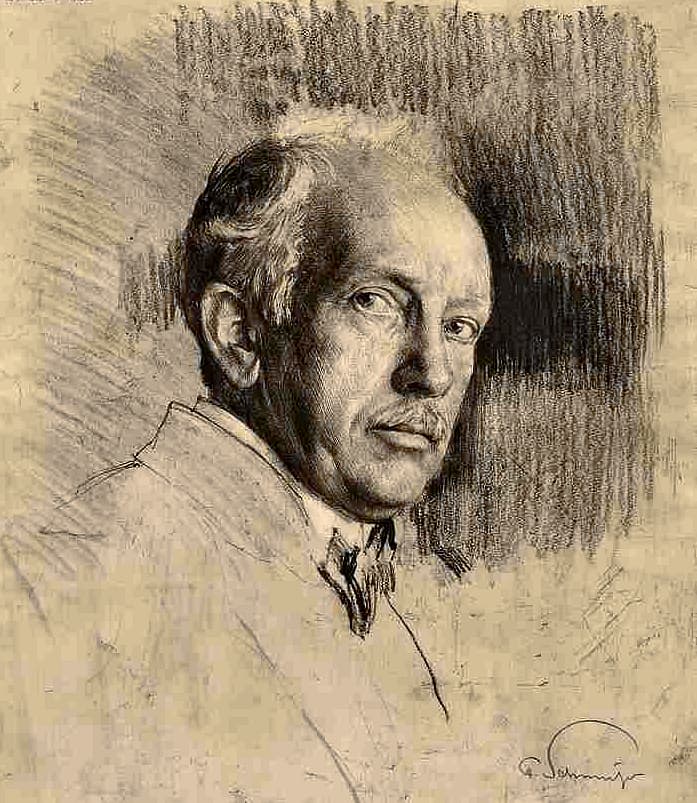
Richard Strauss
It was Strauss’ 12th opera and the first to libretto by Joseph Gregor. However, the opera had been the brainchild of Stefan Zweig, with whom Strauss had previously collaborated on the comic opera Die schweigsame Frau. That opera, however, was banned by the Hitler regime because Strauss refused to remove the Jewish Zweig’s name from the program.
Richard Strauss: Friedenstag, Op. 81 – Allegro ma non troppo – Hast was geseh’n? (Tom Martinsen, tenor; Alfred Reiter, bass; Dresden Staatskapelle; Giuseppe Sinopoli, cond.)
Richard Strauss: Friedenstag, Op. 81 – La rosa, la rosa che un bel fiore (Jochen Kupfer, baritone; Johan Botha, tenor; Tom Martinsen, tenor; Andrei Eckert, bass; Jurgen Commichau, bass; Dresden State Opera Chorus; Dresden Staatskapelle; Giuseppe Sinopoli, cond.)
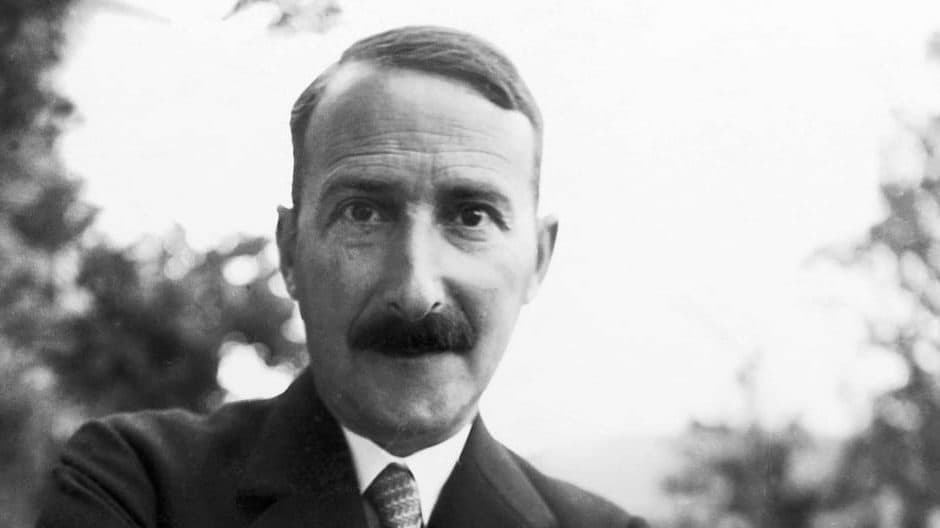
Stefan Zweig
As Strauss later wrote, “I consider the Streicher-Goebbels Jew-baiting as a disgrace to German honour, as evidence of incompetence, the basest weapon of untalented, lazy mediocrity against a higher intelligence and greater talent.” Both Zweig and Strauss were united in their common opposition to the growing militarism and anti-Semitism of the Nazis, but Strauss could not openly collaborate with Zweig. Strauss insisted that he wanted to partner with Zweig, but the writer eventually persuaded the composer to take on Joseph Gregor as “a safe collaborator.” Nevertheless, Zweig continued to work as an adviser and even revised some of the scenes. His influence, scholars agree, remains “in its form and dramatic substance.” Work on the libretto and the musical score progressed rapidly and the initial draft was completed on 24 January 1936, with the orchestration finalized six months later.
Richard Strauss: Friedenstag, Op. 81 – Es sei! Doch hört (Albert Dohmen, bass-baritone; Norbert Klesse, bass; Ekkehard Pansa, bass; Rafael Harnisch, tenor; Dresden State Opera Chorus; Dresden Staatskapelle; Giuseppe Sinopoli, cond.)
Richard Strauss: Friedenstag, Op. 81 – Zu Magdeburg in der Reitschlacht (Albert Dohmen, bass-baritone; Alfred Reiter, bass; Jochen Kupfer, baritone; Tom Martinsen, tenor; Andrei Eckert, bass; Jurgen Commichau, bass; Dresden State Opera Chorus; Dresden Staatskapelle; Giuseppe Sinopoli, cond.)
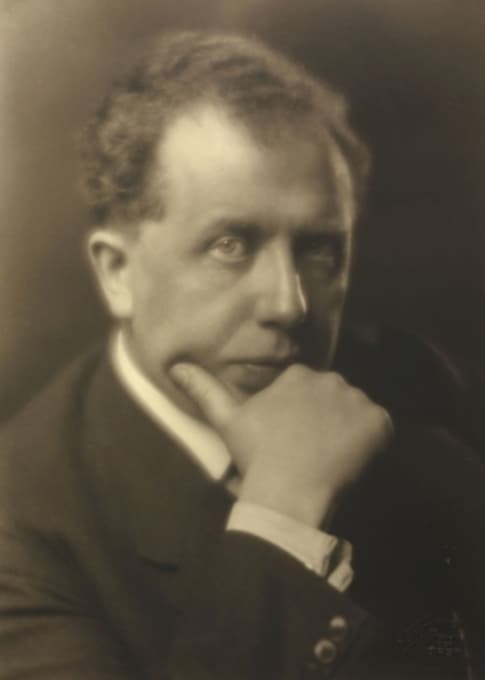
Joseph Gregor © Georg Fayer
The one act opera is dedicated to Viorica Ursuleac, who sang the role of “Maria,” and her husband Clemens Krauss who conducted the premiere. Friedenstag soon played on stages around Germany and Austria, and Adolf Hitler and other top Nazis attended a performance in Vienna on 10 June 1939 as part of Strauss’ 75th birthday celebration. However, performances were halted soon after the beginning of World War II. The opera takes place on the citadel of a beleaguered Catholic town in Germany under siege by Protestant troops from Holstein. It is set on 24 October 1648, the last day of the Thirty Years’ War. A young Italian messenger from Piedmont arrives with a letter from the Emperor to defend the city at all costs. The Mayor and the Bishop beg the Commandant to yield, as everybody is suffering needlessly. The Commandant, however, wants only total victory and dismisses the sentiments. An officer from the front appears and informs the Commandant that the town will fall unless the ammunition under the fortress is used. The Commandant refuses to release the ammunition for combat.
Richard Strauss: Friedenstag, Op. 81 – Wie? Niemand hier? (Deborah Voigt, soprano; Dresden Staatskapelle; Giuseppe Sinopoli, cond.)
Richard Strauss: Friedenstag, Op. 81 – Der Kaiser stand im Saal (Deborah Voigt, soprano; Albert Dohmen, bass-baritone; Dresden Staatskapelle; Giuseppe Sinopoli, cond.)
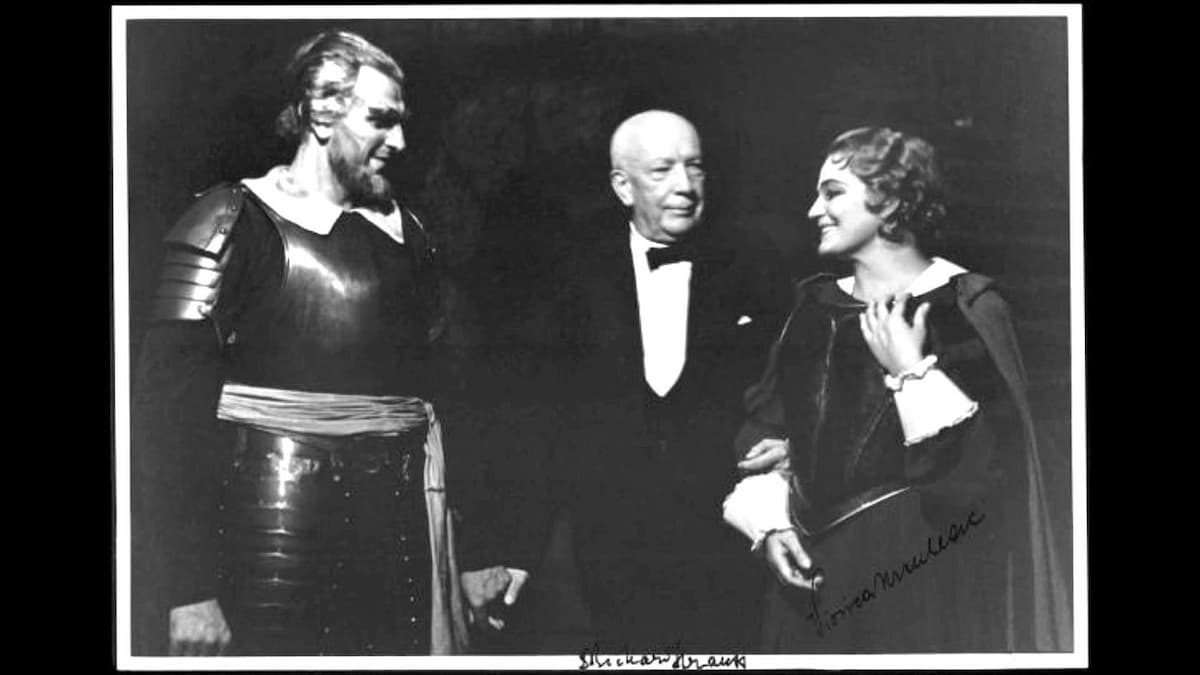
Friedenstag – Hotter, Ursuleac – Strauss (Wien, 1939)
The Commandant orders his soldiers to collect the gunpowder underneath the fortress and to give him the fuse. He recalls how the Sergeant saved his life at the battle of Magdeburg, and now, in turn, offers the Sergeant a chance to leave the fortress. The Sergeant declines, along with the munitions officer and private. Maria, the Commandant’s wife, enters the citadel, and remarks on the crowd and her husband. She has disobeyed his order to not enter the citadel, and he tells her that he plans to explode the fortress. She vows to stay at her husband’s side, and a cannon shot apparently signals an enemy attack. The Commandant extinguishes the wick, preferring to die in battle. The enemy is approaching with flowers in their rifles, and white flags flying in the wind. The Holstein commander offers the news that the war is over, as an armistice has been signed. The Commandant remains mistrustful and draws his sword. Maria steps between them, pleading for peace. The opera concludes with a chorus of reconciliation.
Richard Strauss: Friedenstag, Op. 81 – Nein, nicht Todesnebel (Deborah Voigt, soprano; Jochen Kupfer, baritone; Tom Martinsen, tenor; Alfred Reiter, bass; Dresden Staatskapelle; Giuseppe Sinopoli, cond.)
Richard Strauss: Friedenstag, Op. 81 – Das Zeichen, das Ihr uns verheisset (Sami Luttinen, baritone; Albert Dohmen, bass-baritone; Jon Villars, tenor; Rafael Harnisch, tenor; Norbert Klesse, bass; Ekkehard Pansa, bass; Dresden State Opera Chorus; Dresden Staatskapelle; Giuseppe Sinopoli, cond.)
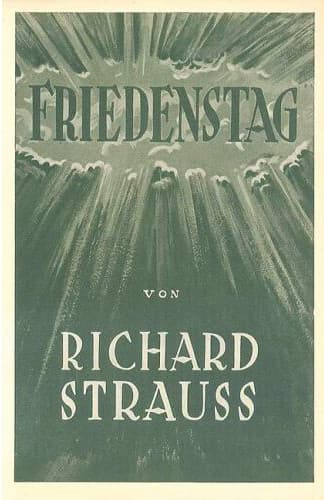
Richard Strauss’ Friedenstag
A musicologist writes, “Zweig and Strauss constructed an opera whose surface aesthetic was acceptable to the Nazis, but had within it a clear pacifist and humanist message. It was an opera dealing with German history (the end of the thirty years’ war in 1648), with the central character of a commandant who appealed to the Nazi ideal of the loyal and dedicated soldier. However, the overall message of peace shone through the masquerade of a National Socialist work.” While the Mayor and townspeople express a pacifist perspective, “Zweig’s skill as a librettist has soldiers describing people using Nazi terminology to denigrate Jews such as “rats” and “enemy within.” Strauss himself was surprised that the Nazis accepted the opera. As he writes, “I fear that this work in which I put the best of myself will not be performed much longer. Will the cataclysm that we all fear soon break out?”
For more of the best in classical music, sign up for our E-Newsletter
Richard Strauss: Friedenstag, Op. 81 – Warum kämpfen wir Jahre um Jahre (Deborah Voigt, soprano; Albert Dohmen, bass-baritone; Attila Jun, bass; Dresden State Opera Chorus; Dresden Staatskapelle; Giuseppe Sinopoli, cond.)
Richard Strauss: Friedenstag, Op. 81 – Wagt es zu denken (Deborah Voigt, soprano; Sabine Brohm, soprano; Jochen Schmeckenbecher, baritone; Jochen Kupfer, baritone; Albert Dohmen, bass-baritone; Matthias Henneberg, baritone; Sami Luttinen, baritone; Tom Martinsen, tenor; Johan Botha, tenor; Jon Villars, tenor; Rafael Harnisch, tenor; Alfred Reiter, bass; Norbert Klesse, bass; Attila Jun, bass; Jurgen Commichau, bass; Andrei Eckert, bass; Ekkehard Pansa, bass; Dresden State Opera Chorus; Dresden Staatskapelle; Giuseppe Sinopoli, cond.)
